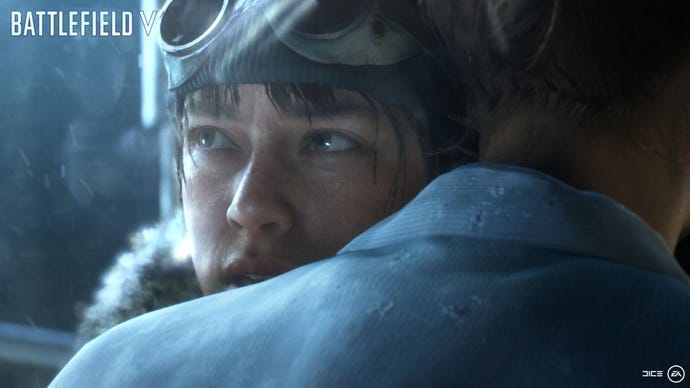Diversity is important because a video game is much more than its gameplay
Video games are crafted from so many parts, it’s difficult to pin down exactly where the ‘game’ exists.
Interactive entertainment is getting increasingly complex and the goals of their creators are more varied than ever. Simply being ‘fun’ often isn't enough. Multicultural teams work together to create virtual places that elicit various emotions as we explore their strange universes and inhabit personalities different from our own.
While we sometimes play games for the pure joy of interacting with something on a screen, we also want to be transported to another place. We want to visit new worlds, and we want to step into the shoes of someone we can never be. To wear a different mask, even for a little while. There’s no limit to where video games can take us.
Despite this hunger for more diversity within our stories and experiences, there are still people who push back, pining for the days when ‘gameplay’ was king. But what even does that word mean? For me, ‘gameplay’ means all the interactive parts: the running, jumping, driving, and shooting. It means the verbs.
Recently, Battlefield 5 came under criticism from some circles for its inclusion of female soldiers. While people are fine with gameplay mechanics that contradict its historical setting - respawning, killing helmet-clad soldiers with a single headbutt - there’s been criticism of the inclusion of women. Why? Because, for some, there’s no tangible gameplay benefit.
According to those people, the women break the illusion more than an enemy magically spawning on a squadmate. To them, women are a pointless addition and spawning on a squadmate just increases the tempo of combat and is there to support the gameplay. The thing is, if something exists in a game, it exists for the players.
Women want to feel represented in their hobby. It gives them more enjoyment than playing as a man. For a lot of men, playing as a woman gives them a break from the norm, in which we’ve come to accept a white man as our default protagonist.
It’s not just women, either. You can count on one hand how many games feature an Arabic protagonist or a disabled hero. Developers are starting to recognise that the audience wants more diverse experiences and they are reacting to this demand. If it improves the game for some and doesn’t affect others - because it shouldn’t bother you - then it is a quality of life addition in the same way gameplay mechanics and accessibility options are.
One argument is that story and gameplay are two separate entities. Interestingly, having women soldiers in Battlefield 5 is viewed by some as a story choice. In other words, they see it as inessential to the multiplayer gameplay, making it a good candidate for stripping out. Let’s humour that viewpoint for a second and have a little thought experiment.
Here I’ll list some of the things that aren’t essential to Battlefield 5:
- Textures
- Different weapons in the same class
- Different models of vehicle
- Voice actors
- Music
The core of Battlefield would remain the same with these things removed. The game would still be a booming shooter where battles rage across grand maps, two teams fighting over objectives using weapons and vehicles. But the arenas would be greyboxed and there would be less variety, leaving behind only the things that are vital to the core experience. Nobody wants this, of course, because it would lose its heart.
You see, a video game is more than a collection of systems. You don’t need more than one type of tank in Battlefield 5, but choice is a good thing. You don’t need to have flashy visual effects such as dust particles and debris with each explosion, but they help craft an illusion. Choice and flavour are as integral to a game as the verbs.
What would Dishonored be without Dunwall, its hyper-real visual style, and the little stories dotted around? What would The Last of Us be without its characters?
These snippets of flavour are what makes games more than a toy. Story, character, environments, music, visuals, choice, mechanics - strip out any part of it and it becomes a lesser experience.
Even in games you would usually associate with pure mechanical joy can be elevated by flavour. Over Christmas I played Tetris Effect because everyone at Eurogamer kept writing op-eds about it. I was sceptical since, you know, it’s Tetris, but it’s a perfect example of classic game that’s been modernised by adding heart.
The soundtrack and visual effects aren’t essential to the core, but they work in harmony with it. It creates an all-encompassing experience that pulls you into the zone, every movement you make registered by the audio, every line clear rewarded with visual spectacle. It transports you to another place - a world where the controller in your hand, the soundtrack in your ear, and the fireworks on the screen connect you to each tetromino.
Even Nintendo - which was famously obsessed with making sure its worlds were fun to traverse, even in an empty room - knows the importance of flavour. It is why you can tweak and pull Mario’s face on the loading screen of Mario 64.
Choice, options, surprise, cosmetic, audio - it’s all there to craft a unique feeling.
A truly historically-accurate WW2 experience wouldn’t make a ‘fun’ video game. That game would give you one life, delete itself after you died, and you would be forced to play it. It’s a period of history that’s impossible to respectfully recreate without any caveats. If that was where the real issue was, people would be up in arms about any game that tried to create a virtual rendition of the conflict, not just the one where you can play as a woman.
Modern video games are more than just a series of actions. Think back to the most recent games you’ve played - the ones that have stuck with you - and I bet many of them linger because they triggered some kind of emotional response.
Imagine you weren’t you, and see how that emotional response could vary if you were transported into someone else’s life - surely God of War has more pull if you’re playing from the perspective of a parent. You might be the only agent of change in many games, but you are not the protagonist of reality.
Now, more than ever, we need games to let us be someone we’re not. We need to spend a while in someone else’s skin. Let’s start 2019 with a little more empathy.













